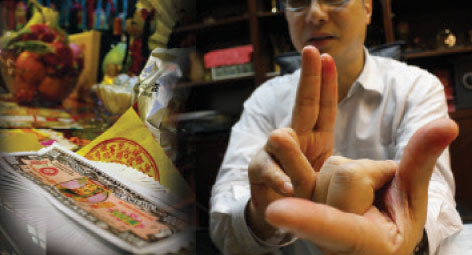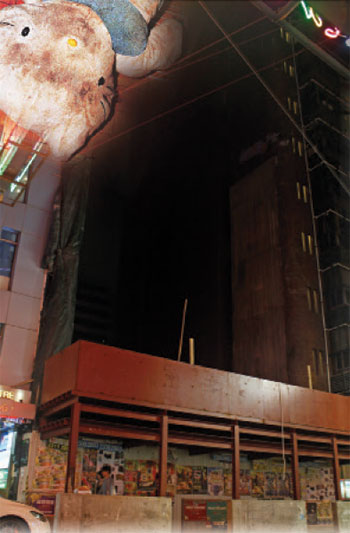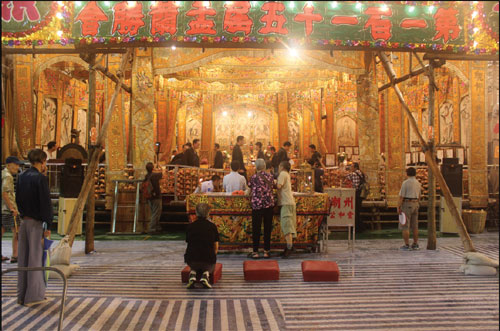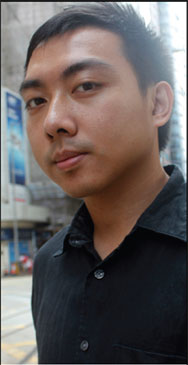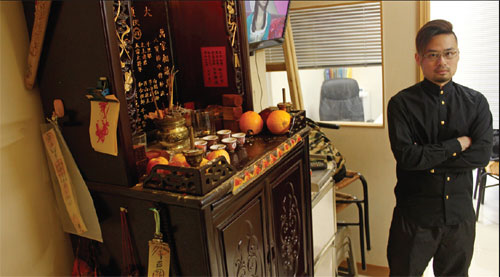House haunting
Updated: 2012-09-15 05:39
By Doug Meigs(HK Edition)
|
|||||||||
|
Right: Taoist master Fong Hoi-yue. If a visit to his altar is not enough to dispel a haunting, he would visit the client's home with his Taoist tools. Left: Offerings at taoist altar. All photos: Doug Meigs / China Daily |
|
Above: One of the dolls discovered by the police in the Hello Kitty murder site which was finally torn down a few weeks ago (right). Provided to China Daily |
|
Throughout the Ghost Month - the seventh month of the lunar calendar - residents burn paper offerings for hungry ghosts. |
They're called 'haunted houses'. Superstitious local people shun these dwellings where homicides, suicides and eerie events have occurred. But these are being snapped up by investors who rent them out to foreigners and students. Doug Meigs reports.
They finally tore down the infamous Hello Kitty murder building a few weeks ago. Demolition work, at the site of one of Hong Kong's most cruel and gruesome homicides, wrapped up near the beginning of this month's Hungry Ghost Festival. Chinese Buddhist and Taoist traditions hold that the entire seventh month of the lunar calendar (Aug 17 to Sept 15 this year) is a time when spirits are free to return, roaming in the realm of the living.
Thirteen years ago, gangsters kidnapped and tortured a nightclub hostess on the third floor of the tenement building. After a month of abuses, the 23-year-old victim died in captors. The three perpetrators stuffed the woman's skull into a Hello Kitty doll, later discovered at the scene by police. The case was solved, when a 14-year-old girlfriend of one of the three men went to police and told them she was haunted by the dead woman's ghost.
All during the past month, flames could be seen rising from metal bins in the shadowy backstreet behind the former building. Such tributes to restless spirits are common throughout Hong Kong during the Hungry Ghost Festival.
For more than a decade, the grim details of the Hello Kitty murder discouraged potential residents. Now, the site is empty, shrouded behind a construction barricade. On the lot's Granville Road side, busy urban life sprawls in all directions: flashing signs, packed hair salons, bright street-side retail shops and an infinite crowd streaming past.
|
Jacky Chiu helps to manage an on-line database of haunted properties and views them as good investment. |
On the dark backside, near where the grisly homicide took place, Poon Wai-ping sits slumped against a wall at the Kimberley Street Refuse Collection Point.
Poon has no idea of what is planned for the now-vacant plot, but he's certain that he wouldn't live on that site, even in a new development: "No one wanted to live in that building. The people moved out. I would definitely move out too if I were living there."
Poon has worked at the refuse collection point going on two years. He knew the sordid details of the Hello Kitty homicide before taking the job, thanks to all the media coverage. He excitedly mentions that some of the victim's body parts were "toasted" and disposed at his workplace. Despite the passage of time, the former building retained its hungza reputation.
Hungza means "haunted house" in Cantonese. The term refers to residences where a suicide, murder or unnatural death had occurred. Properties labeled as "haunted" fetch below-market rental and sales prices. Prospective tenants or buyers often avoid them, fearing bad luck, negative energy or evil spirits. Those who are not superstitious, however, see opportunities for profits and buy up these stigmatized properties at sharply discounted prices.
There is no law requiring that landlords or real estate agents reveal morbid details about any property; although, the Estate Agents Authority (EAA) code of ethics requires agents to avoid misrepresentation and to serve clients with integrity. In an email reply to China Daily, the EAA advised that prospective homebuyers ask specific questions about whether a death or suicide occurred in a property, because "there is no legal definition for the so-called 'haunted house.'"
"I don't mind working near the place," says Poon. "I am not afraid. It's alright. I didn't do anything wrong. I didn't hurt anyone. People don't talk about the murder anymore. But every time I think of it, I still feel, you know, it was so terrible, so tragic."
Commercial tenants continued to occupy the lower floors of the building, until the demolition works began, but neighbors said the upper floors and the rooms facing Kimberley Street had been unoccupied since soon after the young victim's death.
The real-life horror story went like this: Three Triad members abducted the hostess, a single mother named Fan Man-yee, because of mounting debt. They imprisoned her in their TST drug and sex lair. They had decorated the flat with innocent-looking Hello Kitty curtains, bed sheets, kitchenware and dolls. Fan's abductors intended to force her into prostitution and confiscate her earnings, but they took to torturing her instead.
While binging on crystal methamphetamine, they abused her for their own sick entertainment. Then, after leaving her unattended for days, she eventually died from a drug overdose. They ignored her corpse until it began stinking. They dismembered her body for easier disposal but kept her skull. After boiling the skull, they put it inside a giant Hello Kitty mermaid doll.
A teenage girlfriend of one gangster, also an accomplice in the torture sessions, eventually reported their appalling crimes to police. The girl claimed that Fan's ghost was haunting her.
Whether a new building development would disturb the victim's lingering spirit has yet to be seen. Any development plans for the former Hello Kitty murder building remain a mystery to neighbors and nearby real estate agents.
A company called Mega Lane Limited purchased the building with a mortgage from Hang Seng Bank, according to records from the Hong Kong Land Registry.
An assistant marketing manager at a local real estate listing company said an individual investor would not have been able to purchase the building so easily. Jacky Chiu helps to manage a database of haunted properties on the website of Squarefoot.com. He has become a bit of an expert on the local hungza market.

Chiu says hungza apartments are a good investment and was looking to buy one himself, but he abandoned the prospect after he learned that banks don't lend money to individuals trying to buy a haunted house. In fact, he says that a bank's refusal to grant a mortgage is a clear sign that something inauspicious may have occurred at the location.
A handful of local hungza investors do exist. They have earned the nickname "Masters of Haunted Houses" in local media reports. Chiu says they invest for the long-term, earning twice or more the normal rental yield for undervalued, unwanted flats.
"Most of the investors are (local) Chinese people who are very clever. They know that Chinese people are not interested in haunted houses, so they target other demographics like expats," he says, speaking from Squarefoot's office in Wanchai.
"I find it quite interesting but a new target is exchange students from the Chinese mainland," he continues. "Maybe in Hong Kong it's not easy to rent an apartment, but a haunted house is much cheaper and easier to rent, so they don't care. Recently some young families have proven they aren't worried about the issue either."
The fact that more people are willing to live in a hungza property is a clear reflection of the city's superheated real estate market. The overall price of residential property has leapt 87.7 percent since 2009, according to Centaline's most recent local property index figures. Competition for the undesirable homes has surged, too.
"We've found that the revenue from selling these haunted houses has increased a lot. Two years ago, you could buy a haunted house for 40 percent off market price. Now it's only 15 percent off," Chiu says, noting that rental yield is currently around 4 to 8 percent.
Squarefoot began its haunted house listing about two years ago. And in 2011, it began an English version. Chiu and colleagues monitor daily news reports of terrible, violent or unnatural deaths. Anything that might qualify, he says, they add to their database. A handful of similar websites exist in Chinese and predate Squarefoot's catalog. "Unlucky house" Web listings are also available in Japan, Taiwan and other international markets.
Chiu says the listings provide references for flats to avoid, and could also provide a resource for buyers looking to negotiate better prices. Squarefoot's list is accessible by clicking on a red skull tab on the website.
Scanning the database provides a cross-section of Hong Kong's most depressing domestic circumstances: a husband strangled his wife over a marital dispute in their Causeway Bay flat; a doctor in affluent Happy Valley jumped off his building due to over work; a cocaine addict with two children committed suicide in her Tin Shui Wai home by burning charcoal; the list continues through countless pages of tragedy.
Squarefoot's website also provides a ranking of Hong Kong's "top-10 most thrilling" districts, ranked according to the number of deadly incidents compiled. Tuen Mun is the "most haunted" according to the data, followed by Wong Tai Sin and then Tin Shui Wai.
Rather than offering any proof of bad energy or prevalence of spirits, the ranking may well be skewed toward low-income neighborhoods owing to socio-economic factors. The list's featured districts are densely populated new towns and residential areas with low income levels and higher instances of poverty, crime and drug abuse.
If, for some reason, a Hong Kong resident discovers his house to be haunted, a multitude of feng shui and Taoist masters are eager to assist. China Daily spoke with a young, up-and-coming feng shui master and a Taoist master who earned his title roughly 30 years ago. These practitioners estimated that thousands of local masters are able to purify or exorcise unwanted spirits for prices ranging from hundreds to many hundreds of thousands of dollars.
Master Chow Fat-yuen is in his early 30s. He says he's young for a feng shui master, and is gradually building his clientele through word-of-mouth referrals. A person could be haunted for a variety of reasons: "The reason could be destiny or fate, or maybe you live in a haunted house, or perhaps it's because of an individual's actions, for example an abortion."
Clients provide Chow birth dates and other numerical data that he uses to produce calculations, with the assistance of various divining tools (fortune telling sticks, coins in a turtle shell) and a geomantic compass to prescribe ways of redirecting energy within their home. Though he notes that feng shui alone is not capable of exorcising a lingering spirit - that might require religious help, or a Taoist master.
A few blocks away from Chow's modest office in Prince Edward, Master Fong Hoi-yue sits at a heavy wood desk surrounded by plaques, accolades and newspaper printouts. Fong says the Ghost Month is the busiest time of year for him.
Clients seeking to dispel spirits can visit his elaborate Taoist altar in a separate room full of incense, charms and ritual objects, bearing spells written in mystical calligraphy. If a visit to his altar is not enough to dispel a haunting, he would visit the client's home with his Taoist tools (hulu gourd, a feathered fan, spirit armor, and magic water) to purify or exorcise the lingering spirit.
Both masters offered the same general advice to prospective homeowners: Don't live in a hungza property. But as investment, owning and renting to others is okay. Fong also warns that bad energy can seep from an apartment to nearby residences and floors. He says that homes near where a suicidal person jumped and landed could also be haunted.
In Hong Kong's hyper-condensed urban landscape, new residential towers are constantly emerging above grim place histories. Bubonic plague in Sheung Wan killed 20,000 people at the turn of the 20th Century. The entire Tai Ping Shan St area was demolished and rebuilt.
Buildings with ghost stories are well-known throughout Hong Kong's districts. The Garley Building in Jordan, home to Hong Kong's most fatal fire has a haunted reputation. Wanchai is also home to numerous haunted sites, some related to World War II atrocities.
At 7 Star Street, a shrine supposedly placates the spirits of civilians killed by a Japanese bomb dropped during the war. Neighbors told China Daily that the shrine was originally located beneath the site of the enormous Starcrest Podium building.
Ghosts evidently protested at the shrine's removal, moaning and wailing, forcing the developer to reconstruct the small temple, now located at a nearby dead-end, with a giant red feng shui panel hanging from part of the building (built and managed by Swire Properties).
A chef at an adjacent restaurant stepped outside for a break and shared more recent ghost sightings. "Some of my staff, they've seen ghosts sitting or standing right here on the pavement," he says, puffing a cigarette while a resident burns paper offerings for the Ghost Month.
Neighbors and residents recounted various versions of the shrine's history, but Starcrest staff and Swire PR representatives deny knowledge of it. After all, why lend credence to rumors of ghostly hauntings. What if prospective buyers demanded a hungza discount? Now that's scary.
|
Young feng shui master Chow Fat-yuen is building his clientele through word-of-mouth referrals. Local masters would provide purification services for prices ranging from hundreds to thousands of dollars. |
(HK Edition 09/15/2012 page4)
